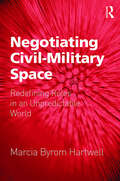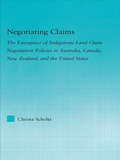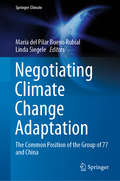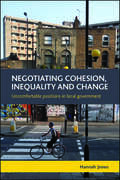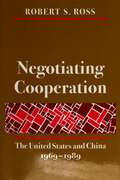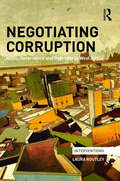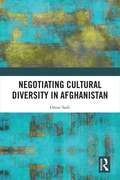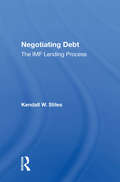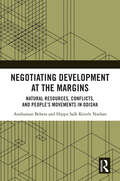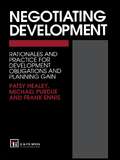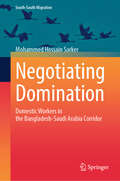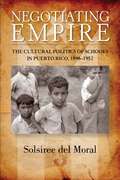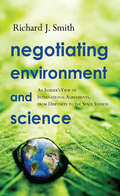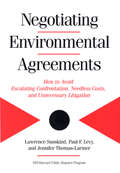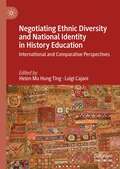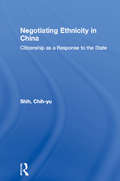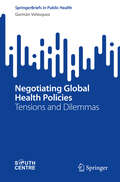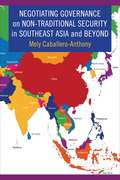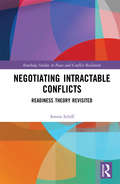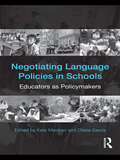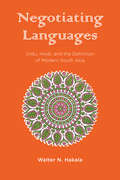- Table View
- List View
Negotiating Civil-Military Space: Redefining Roles in an Unpredictable World
by Marcia Byrom HartwellThis book begins discussion at a point where many civil–military conversations end. Hartwell identifies underlying dynamics, key issues, and challenges that civilian and military organizations encounter when negotiating their roles in real and virtual volatile environments. These include managing expectations, understanding organizational missions and cultures, building trust, and exploring different approaches to violence. The impact of applied technologies on decision making processes and interventions is discussed in terms of recent and future complex crises. Linking earlier history to current discussions, this study makes an important contribution by reframing issues and outlining strategies to avoid unintended consequences and more effectively protect civilians in future operations. While geographic focus is on the Middle East, Africa, Central Asia, and Asia-Pacific, the core issues are applicable to negotiating civil–military relationships in a wide range of environments.
Negotiating Claims: The Emergence of Indigenous Land Claim Negotiation Policies in Australia, Canada, New Zealand, and the United States (Indigenous Peoples and Politics)
by Christa ScholtzWhy do governments choose to negotiate indigenous land claims rather than resolve claims through some other means? In this book Scholtz explores why a government would choose to implement a negotiation policy, where it commits itself to a long-run strategy of negotiation over a number of claims and over a significant course of time. Through an examination strongly grounded in archival research of post-World War Two government decision-making in four established democracies - Australia, Canada, New Zealand, and the United States - Scholtz argues that negotiation policies emerge when indigenous people mobilize politically prior to significant judicial determinations on land rights, and not after judicial change alone. Negotiating Claims links collective action and judicial change to explain the emergence of new policy institutions.
Negotiating Climate Change Adaptation: The Common Position of the Group of 77 and China (Springer Climate)
by María del Pilar Bueno Rubial Linda SiegeleThis book discusses the history of the Group of 77 and China’s negotiating position on adaptation to climate change in the context of the United Nations Framework Convention on Climate Change (UNFCCC). It also addresses a number of questions that have arisen, such as: What was the process for constructing a collective position of the G77 and China on adaptation? Why is it worthwhile to negotiate in a group of such dimensions? What are the incentives for reaching the broadest common position on adaptation? What is the role of the leading coordinators, and how is this linked to the rotating annual Presidency of the G77 and China? And, how do the subgroups of the G77 participate in reaching this general position? Written by former and current adaptation negotiators from developing countries, the book offers various perspectives from the subgroups and leading coordinators of the G77 and China as well as other organizations. Furthermore, in contrast to previous analyses on climate change negotiations, which focus mainly on the behaviour or position of one group, it presents a unique approach based on the strength of collectivism in the G77 and China. The book appeals to practitioners and professionals as well as scientists in climate change management and policy, impacts and adaptation, international relations, as well as diplomacy and development.
Negotiating Cohesion, Inequality and Change: Uncomfortable Positions in Local Government
by Hannah JonesHow are multiculturalism, inequality and belonging understood in the day-to-day thinking and practices of local government? Examining original empirical data, this book explores how local government officers and politicians negotiate 'difficult subjects' linked with community cohesion policy: diversity, inequality, discrimination, extremism, migration, religion, class, power and change. The book argues that such work necessitates 'uncomfortable positions' when managing ethical, professional and political commitments. Based on first-hand experience of working in urban local government and extensive ethnographic, interview and documentary research, the book applies governmentality perspectives in a new way to consider how people working within government are subject to regimes of governmentality themselves, and demonstrates how power operates through emotions. Its exploration of how 'sociological imaginations' are applied beyond academia will be valuable to those arguing for the future of public services and building connections between the university and wider society, including scholars and students in sociology, social policy, social geography, urban studies and politics, and policy practitioners in local and central government. Winner of the BSA Philip Abrams Memorial Prize 2014
Negotiating Cooperation: The United States and China, 1969-1989
by Robert S. RossIn the 1970s and 1980s the United States and China developed cooperative relations to enhance security against the USSR. Conventional wisdom claims Washington and Beijing agreed to 'shelve' conflictual issues; where conflict occurred, diplomatic error or domestic politics are blamed. This book shows, however, that US-China cooperation was fragile precisely because of ongoing conflicts, notably that over Taiwan. The author disputes Kissinger's claim that only he and Nixon understood Taiwan's unimportance. China never found the US stance on Taiwan acceptable, and the issue required constant attention. The book shows how the two powers built cooperative relations despite Taiwan. It explains how negotiations were conducted, and why the two powers at times compromised and at times accepted the status quo. It examines why relations on occasion became acrimonious and why the acrimony subsided.
Negotiating Corruption: NGOs, Governance and Hybridity in West Africa (Interventions)
by Laura RoutleyNegotiating Corruption demands that we think again about corruption in Africa. It problematises the framing of African corruption as a phenomenon that emerges from a clash between two sets of norms. Moreover, it highlights the colonial legacies of this frame, which situates African corruption within continually recurring debates about the political inclusion or banishment of 'others'. NGOs are characterised as intermediaries between the local and the international, and between the state and the population. In both of these roles they are understood to reform governance by bringing about changes in culture and instituting bureaucratic norms. They have, therefore, been seen as part of the apparatus of a global liberal governmentality. This book complicates this portrayal and highlights the ambiguous role of liberal governmentality through an exploration of the 'grey practices' of the NGOs studied. These practices are 'grey' as they do not fit the pattern of virtuous NGOs holding the state to account described in development policy, yet at the same time they ensure that the state produces the outcomes that a fully-functioning state ought to. This enacting of oppositional and antagonistic elements is further unpacked in conversation with Homi Bhabha's concepts of negotiation and hybridity. Negotiating Corruption draws attention to both the limitations of current explanations of corruption in Africa and the problematic way in which they are framed. The book's detailed engagement with understandings of corruption within policy and academic debates will make it a useful resource for undergraduate teaching. It will also be of keen interest to researchers, academics, and postgraduate students who engage with the issues of corruption, NGOs, civil society, African politics, governmentality, and hybridity.
Negotiating Cultural Diversity in Afghanistan
by Omar SadrThis book analyses the problematique of governance and administration of cultural diversity within the modern state of Afghanistan and traces patterns of national integration. It explores state construction in twentieth-century Afghanistan and Afghan nationalism, and explains the shifts in the state’s policies and societal responses to different forms of governance of cultural diversity. The book problematizes liberalism, communitarianism, and multiculturalism as approaches to governance of diversity within the nation-state. It suggests that while the western models of multiculturalism have recognized the need to accommodate different cultures, they failed to engage with them through intercultural dialogue. It also elaborates the challenge of intra-group diversity and the problem of accommodating individual choice and freedom while recognising group rights and adoption of multiculturalism. The book develops an alternative approach through synthesising critical multiculturalism and interculturalism as a framework on a democratic and inclusive approach to governance of diversity. A major intervention in understanding a war-torn country through an insider account, this book will be of great interest to scholars and researchers of politics and international relations, especially those concerned with multiculturalism, state-building, nationalism, and liberalism, as well as those in cultural studies, history, Afghanistan studies, South Asian studies, Middle East studies, minority studies, and to policymakers.
Negotiating Debt: The Imf Lending Process
by Kendall W. StilesThis book aims to develop and test a model of International Monetary Fund (IMF) decision-making that will offer a better understanding of how the IMF applies its lending terms to individual countries such as Jamaica, Zaire, Sudan, India, United Kingdom, Turkey and Argentina.
Negotiating Development at the Margins: Natural Resources, Conflicts, and People’s Movements in Odisha
by Anshuman Behera Hippu Salk NathanThis book critically examines various facets of conflicts involving people and the state arising due to the uneven distribution of natural resources. It provides an overview of the people’s movements in Odisha, a resource-rich state in eastern India. Reflecting on the conceptual frameworks of conflict, it analyses violence, and struggle for rights over resources, and public policies around natural resources, alongside local strategies and governance. Drawing from extensive field surveys in the villages of Kalahandi and undivided Koraput districts in Odisha, this volume explores the sociopolitical and economical aspects of people’s movements instead of solely viewing them as political and security threats. The authors demonstrate the misappropriations of these movements by both the state and non-state actors for their vested interests. This book offers recommendations for policymakers to draw up a more ready response to mitigate and minimize the conflict and violence and implement equitable policies around land and resources. While doing so, the book also provides some primers to development perspectives, the role of natural resources and conditions under which the natural resources can result in conflict, and principles and practices to overcome such conflicts. The volume will be an indispensable read for researchers and students of social history, social reform, tribal and indigenous studies, postcolonial studies, exclusion studies, development studies, political sociology, and South Asian studies.
Negotiating Development: Rationales and practice for development obligationsand planning gain
by Frank Ennis F. Ennis P. Healey Prof Patsy Healey M. PurduePlanning gain is the legal process by which property development is linked to social provisions. This book examines the rationale for planning gain and development obligations and reviews the practice of development negotiation through a wide range of case histories.
Negotiating Domination: Domestic Workers in the Bangladesh-Saudi Arabia Corridor (International Perspectives on Migration)
by Mohammed Hossain SarkerThis book explores the remarkable agency and resilience of live-in women Migrant Domestic Workers MDWs. By delving into the lived experiences of Bangladeshi women in the Saudi Arabian migration corridor, it provides an insightful representation of the struggles and strategies employed by approximately 8.45 million women domestic workers globally. Unlike traditional literature that underscores exploitation and forced labor, this book uniquely captures the diverse strategies MDWs utilize to navigate and overcome the pervasive power asymmetries and constraints in their employment relationships. Through detailed accounts of everyday resistance, coping mechanisms, persuasive tactics, and small-scale confrontations, the book challenges prevailing perceptions and offers a fresh perspective on MDWs' agency. Drawing on the experiences of 50 returnee MDWs, this comprehensive book is a vital resource for scholars, researchers, policymakers, and development partners in migration studies. It invites readers to rethink the conventional portrayal of MDWs, acknowledging their strength and ingenuity in the face of adversity and offering a nuanced understanding of their complex realities.
Negotiating Empire
by Solsiree Del MoralAfter the United States invaded Puerto Rico in 1898, the new unincorporated territory sought to define its future. Seeking to shape the next generation and generate popular support for colonial rule, U. S. officials looked to education as a key venue for promoting the benefits of Americanization. At the same time, public schools became a site where Puerto Rican teachers, parents, and students could formulate and advance their own projects for building citizenship. In Negotiating Empire, Solsiree del Moral demonstrates how these colonial intermediaries aimed for regeneration and progress through education. Rather than seeing U. S. empire in Puerto Rico during this period as a contest between two sharply polarized groups, del Moral views their interaction as a process of negotiation. Although educators and families rejected some tenets of Americanization, such as English-language instruction, they also redefined and appropriated others to their benefit to increase literacy and skills required for better occupations and social mobility. Pushing their citizenship-building vision through the schools, Puerto Ricans negotiated a different school project-one that was reformist yet radical, progressive yet traditional, colonial yet nationalist.
Negotiating Environment and Science: An Insider's View of International Agreements, from Driftnets to the Space Station
by Richard J. SmithIn this thought-provoking new book, career U.S. State Department negotiator Richard J. Smith offers readers unprecedented access to the details about some of the most complex and politically charged international agreements of the late and immediate post Cold War era. During his nine years as Principal Deputy Assistant Secretary in the Bureau of Oceans and International Environmental and Scientific Affairs, Smith led U.S. negotiations on many significant international agreements. In Negotiating Environment and Science, Smith presents first-hand, in-depth accounts of eight of the most high-profile negotiations in which he was directly involved. The negotiations Smith covers are wide-ranging and include the London agreement to amend the Montreal Protocol on Substances that Deplete the Ozone Layer, the international space station agreement, the U.S.-Soviet (eventually, U.S.-Russian) agreement on scientific cooperation, the U.S.-Canada acid rain agreement, the negotiations in Sofia, Bulgaria that established a first link between human rights and the environment, and a contentious confrontation with Japan over driftnet fishing. Smith chronicles the development of these negotiations, the challenges that emerged (as much within the U.S. delegations as with the foreign partners), and the strategies that led to substantive treaties. Smith infuses his narrative with unique historical insight as well as astute observations that can guide U.S. strategies toward productive international agreements in the future. His book also highlights the shift in diplomatic focus over the past 25 years from arms control and other security-related agreements to international and trans-boundary agreements that address global environmental threats and promote cooperative approaches in science and technology. Written for an audience with a general interest in environmental issues as well as international relations, Negotiating Environment and Science will also be an important resource for historians, political scientists, and students in international law and diplomacy.
Negotiating Environmental Agreements: How To Avoid Escalating Confrontation Needless Costs And Unnecessary Litigation
by Paul Levy Lawrence Susskind Jennifer Thomas-LarmerWhen business leaders, government officials, and other stakeholders come to the table in an environmental, health, or safety dispute, acrimony often results, leading to expensive and time-consuming litigation. Not only does this waste precious resources, but rarely does the process produce the best outcome for any of the parties involved.For the past five years, the authors of this volume have conducted semi-annual seminars at the MIT and at Harvard to provide business leaders and regulators with the knowledge and skills they need to more effectively handle environmental, health, and safety negotiations. Their strategy, known as the "mutual gains approach," is a proven method of producing fairer, more efficient, more stable, and wiser results. Negotiating Environmental Agreements provides the first comprehensive introduction to this widely practiced and highly effective approach to environmental regulation.The book begins with an overview of the mutual gains approach, introducing important concepts and ideas from negotiation theory as well as the theory and practice of mediation. The authors then offer five model negotiations from their MIT-Harvard Public Disputes seminar, followed by a series of real-world negotiated environmental agreements that illustrate the kinds of outcomes possible when the mutual gains approach is employed. A collection of writings by leading experts provide valuable insights into the process, and appendixes offer both instructions for conducting model negotiation sessions and analysis of actual game results from earlier seminars.This is the only prescriptive text available for the many regulatees and regulators involved in environmental regulatory negotiations each year. Anyone involved with environmental negotiation -- including corporate and public sector managers, students of environmental policy, environmental management, and business management -- will find the book an essential resource.
Negotiating Ethnic Diversity and National Identity in History Education: International and Comparative Perspectives
by Luigi Cajani Helen Mu Hung TingThis edited book explores the problems and challenges of negotiating the representation of ethnic minorities within history education. It investigates how states balance the (non-)acknowledgement of the reality of cultural or religious diversity, and the promotion of a point of convergence in history education to foster national identity. Shifting our attention away from the intractable challenges posed by post-conflict countries for reconciliation, the contributors draw attention to the need to explore ways to prevent or pre-empt conflicts and exclusion through history education, which could contribute to developing a more sustainable culture of peace. Drawing on a wide range of contexts and sources, this book asks how history education could contribute to forming critical, historically informed, and committed young citizens. The book will be of interest to students and academics working on themes such as nationalism, citizenship, ethnicity, history education, multicultural education, peace studies and area studies, as well as practitioners in the fields of history, social studies, civic or citizenship.
Negotiating Ethnicity in China: Citizenship as a Response to the State (Routledge Studies on China in Transition)
by Chih-yu ShihThis challenging study brings together anthropology and political science to examine how ethnic minorities are constructed by the state, and how they respond to such constructions.Disclosing endless mini negotiations between those acting in the name of the Chinese state and those carrying the images of ethnic minority, this book provides an image of the framing of ethnicity by modern state building processes. It will be of vital interest to scholars of political science, anthropology and sociology, and is essential reading to those engaged in studying Chinese society.
Negotiating Europe
by Oriane CalligaroThe book explores the various actors and forms of the promotion of Europeanness at the EU level from 1950s until the present day.
Negotiating Genocide in Rwanda
by Erin JesseeThis book is an oral history-based study of the politics of history in the aftermath of the 1994 genocide in Rwanda. Using life history and thematic interviews, the author brings the narratives of officials, survivors, returnees, perpetrators, and others whose lives have been intimately affected by genocide into conversation with scholarly studies of the Rwandan genocide, and Rwandan history more generally. In doing so, she explores the following questions: How do Rwandans use history to make sense of their experiences of genocide and related mass atrocities? And to what end? In the aftermath of such violence, how do people's interpretations of the varied forms of suffering they endured then influence their ability to envision and support a peaceful future for their nation that includes multi-ethnic cooperation?
Negotiating Global Health Policies: Tensions and Dilemmas (SpringerBriefs in Public Health)
by Germán VelásquezThis book presents reflections and research that highlight tensions in the ongoing negotiations on pandemic preparedness treaties and revisions to the International Health Regulations, underscoring the geopolitical divide between developed and developing countries. It advocates regional health initiatives as a response to the multilateral impasse and reflects on the erosion of foundational public health concepts such as "essential medicines". New pandemics are inevitable. How can we best prepare for them and, above all, how can we avoid the mistakes and injustices made during the COVID-19 pandemic? Negotiations are underway to formulate a binding international treaty on prevention and preparedness to ensure fairer responses to future pandemics. This book is intended as a critical contribution to the current debates. How can equitable access to medicines and diagnostics be guaranteed when they are produced in a small number of countries? How can we explain the fact that current funding for cooperation in the field of health is in the hands of a small group of Northern countries and foundations from the North? How can the role of the World Health Organization be strengthened? WHO now plays only a minor role in coordinating public health policies. How is it that the concept of &“essential medicines&”, a major advance in public health policy, is being replaced by that of &“medical countermeasures&”, a term more in line with the private sectors? Preparing for future pandemics forces us to ask ourselves: how can we safeguard the general interest, the defense of human rights and public health? Negotiating Global Health Policies: Tensions and Dilemmas is essential reading for negotiators from the 194 member countries of the World Health Organization (WHO), the World Trade Organization (WTO), and the World Intellectual Property Organization (WIPO) who participate in international negotiations on health and development. Academics and students of medicine, health sciences, law, sociology and political science, as well as intergovernmental organizations and non-governmental organizations who work on access to medicines and global health issues, also would find the book of interest.
Negotiating Governance on Non-Traditional Security in Southeast Asia and Beyond
by Mely Caballero-AnthonyThe threats the world currently faces extend beyond traditional problems such as major power competition, interstate conflict, and nuclear proliferation. Non-traditional security challenges such as climate change, migration, and natural disasters surpass states’ capacity to address them. These limitations have led to the proliferation of other actors—regional and international organizations, transnational networks, local and international nongovernmental organizations—that fill the gaps when states’ responses are lacking and provide security in places where there is none.In this book, Mely Caballero-Anthony examines how non-traditional security challenges have changed state behavior and security practices in Southeast Asia and the wider East Asia region. Referencing the wide range of transborder security threats confronting Asia today, she analyzes how non-state actors are taking on the roles of “security governors,” engaging with states, regional organizations, and institutional frameworks to address multifaceted problems. From controlling the spread of pandemics and transboundary pollution, to managing irregular migration and providing relief and assistance during humanitarian crises, Caballero-Anthony explains how and why non-state actors have become crucial across multiple levels—local, national, and regional—and how they are challenging regional norms and reshaping security governance. Combining theoretical discussions on securitization and governance with a detailed and policy-oriented analysis of important recent developments, Negotiating Governance on Non-Traditional Security in Southeast Asia and Beyond points us toward “state-plus” governance, where a multiplicity of actors form the building blocks for multilateral cooperative security processes to meet future global challenges.
Negotiating Identities in Nordic Migrant Narratives: Crossing Borders and Telling Lives
by Pia Lane Bjørghild Kjelsvik Annika Bøstein MyhrThis edited volume takes an interdisciplinary approach to the question of how identities are negotiated and a sense of belonging established in a world of increasing migration and diversity. Transcending field-specific approaches and differences in foci, the authors investigate how identity is constructed and mediated in face-to-face interactions (in real time and fictional writing), how writers use narratives to express their reorientation and their identity negotiation in a new homeland, and how material objects convey layered meaning to identity and belonging. This engagement with spoken, written and material mediation of identity resonates with recent sociolinguistic investigations on how language is connected to and intersects with embodiment, materiality and time. The volume will be of interest to students and scholars of globalisation and migration studies, sociolinguistics and narrative analysis, anthropology and cultural studies.
Negotiating Identity in the Ancient Mediterranean
by Denise DemetriouThe Mediterranean basin was a multicultural region with a great diversity of linguistic, religious, social, and ethnic groups. This dynamic social and cultural landscape encouraged extensive contact and exchange among different communities. This book seeks to explain what happened when different ethnic, social, linguistic, and religious groups, among others, came into contact with each other. What means did they employ to mediate their interactions? How did each group construct distinct identities while interacting with others? What new identities came into existence because of these contacts? Denise Demetriou brings together several strands of scholarship that have emerged recently, especially ethnic, religious, and Mediterranean studies. It reveals new aspects of identity construction in the region examining the Mediterranean as a whole and focuses not only on ethnic identity but also other types of collective identities, such as civic, linguistic, religious, and social identities.
Negotiating Intractable Conflicts: Readiness Theory Revisited (Routledge Studies in Peace and Conflict Resolution)
by Amira SchiffThrough the lens of readiness theory, this book focuses on elements that determine the success and failure in negotiating peace agreements in intractable ethno-national conflicts. Examining three cases of mediated negotiation in Aceh, Sudan, and Sri Lanka, the book provides an analytical framework for studying the processes underlying the movement toward conflict resolution. By studying readiness theory's capacity to identify the factors that influence parties’ readiness to reach an agreement, it constitutes another step in the development of readiness theory beyond the pre-negotiation stage. The work highlights the central role that third parties – mediators and the international community – play in the success or failure of peace processes, illuminating the mechanisms through which third parties affect the dynamics and outcome of the process. The systematic examination of readiness theory in these cases is instructive for researchers as well as for practitioners who seek to successfully mediate intractable conflicts and help adversaries achieve peace accords. This book will be of much interest to students of conflict resolution, peace studies, Asian politics, African politics and international relations in general.
Negotiating Language Policies in Schools: Educators as Policymakers
by Kate MenkenEducators are at the epicenter of language policy in education. This book explores how they interpret, negotiate, resist, and (re)create language policies in classrooms. Bridging the divide between policy and practice by analyzing their interconnectedness, it examines the negotiation of language education policies in schools around the world, focusing on educators’ central role in this complex and dynamic process. Each chapter shares findings from research conducted in specific school districts, schools, or classrooms around the world and then details how educators negotiate policy in these local contexts. Discussion questions are included in each chapter. A highlighted section provides practical suggestions and guiding principles for teachers who are negotiating language policies in their own schools.
Negotiating Languages: Urdu, Hindi, and the Definition of Modern South Asia (South Asia Across the Disciplines)
by Walter HakalaPrior to the nineteenth century, South Asian dictionaries, glossaries, and vocabularies reflected a hierarchical vision of nature and human society. By the turn of the twentieth century, the modern dictionary had democratized and politicized language. Compiled "scientifically" through "historical principles," the modern dictionary became a concrete symbol of a nation's arrival on the world stage. Following this phenomenon from the late seventeenth century to the present, Negotiating Languages casts lexicographers as key figures in the political realignment of South Asia under British rule and in the years after independence. Their dictionaries document how a single, mutually intelligible language evolved into two competing registers—Urdu and Hindi—and became associated with contrasting religious and nationalist goals. Each chapter in this volume focuses on a key lexicographical work and its fateful political consequences. Recovering texts by overlooked and even denigrated authors, Negotiating Languages provides insight into the forces that turned intimate speech into a potent nationalist politics, intensifying the passions that partitioned the Indian subcontinent.
